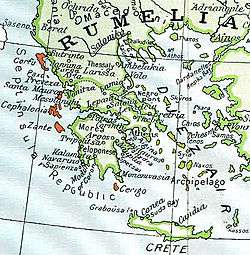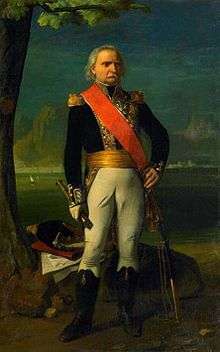French rule in the Ionian Islands (1807–1814)
The second period of French rule in the Ionian Islands (Greek: Δεύτερη Γαλλοκρατία των Επτανήσων, romanized: Dėfteri Gallokratía ton Eptaníson) began in August 1807, when the Septinsular Republic, a Russian protectorate comprising the seven Ionian Islands, was occupied by the First French Empire in accordance with the Treaty of Tilsit. The French annexed the Republic but maintained most of its institutions for local governance. In 1809–10, the British occupied the southernmost islands, leaving only Corfu, Paxoi, and the mainland exclave of Parga in French hands. The British also imposed a naval blockade on the French-ruled islands, which began to suffer from famine. Finally, the British occupied Paxoi in late 1813 and Parga in March 1814. Following the Abdication of Napoleon, the French governor-general in Corfu, François-Xavier Donzelot, capitulated and the French garrison was evacuated. In 1815, the islands became a British protectorate, the United States of the Ionian Islands.
| French rule in the Ionian Islands | |||||||||
|---|---|---|---|---|---|---|---|---|---|
| Possession of the First French Empire | |||||||||
| 1807–1814 | |||||||||
.svg.png) | |||||||||
 Map of the Ionian Islands as the "Septinsular Republic" in orange, in 1801; Ottoman territory in green | |||||||||
| Capital | Corfu | ||||||||
| Government | |||||||||
| Governor-general | |||||||||
• 1807–1808 | César Berthier | ||||||||
• 1808–1814 | François-Xavier Donzelot | ||||||||
| Historical era | Napoleonic Wars | ||||||||
• Treaty of Tilsit | July 1807 | ||||||||
| October 1809 | |||||||||
• British capture of Lefkada | April 1810 | ||||||||
• British capture of Parga | 22 March 1814 | ||||||||
| April 1814 | |||||||||
• Surrender of Corfu | June 1814 | ||||||||
| |||||||||
| Today part of | |||||||||
Establishment
In the Treaty of Tilsit, concluded in July 1807, Russia ceded the Septinsular Republic to Napoleonic France.[1] On 20 August, French troops landed on Corfu, followed three days later by General César Berthier, who received control of the islands from the Russian admiral Dmitry Senyavin. As the Russians departed, French troops replaced them in all islands, as well as the mainland dependency of Parga. Finally, on 1 September, contrary to his instructions to preserve the Islands' constitution, Berthier as Governor-General declared the annexation of the Septinsular Republic to France.[2][3]

Berthier moved swiftly to abolish the Republic's attributes as an independent state: the French flag was raised, all public officials and soldiers took an oath of allegiance to Napoleon, the embassies and agencies of the Republic abroad were abolished, and all domestic bodies apart from the courts and the Ionian Senate as well.[3] These measures annoyed Napoleon, who replaced Berthier as Governor-General with François-Xavier Donzelot.[3] His chief task, according to the instructions sent by Napoleon, was to defend the islands, and above all Corfu, against the mounting British threat.[2]
In November 1807, Napoleon regulated the administration of the new French possessions: the internal structure of the Republic was retained largely along the lines of the 1803 Constitution,[4][2] including the Ionian Senate (although its members were now appointed rather than elected), but the administration was overseen by a Governor-General and an Imperial Commissioner, with Julien Bessières the first to occupy the latter post.[2]
British attacks on the Ionian Islands
The British had reacted to the French takeover of the islands by a naval blockade, which impeded both trade and the supply of the islands. The resulting hardships, and the activities of British agents, inflamed anti-French sentiments, and some Ionian captains petitioned the British commander-in-chief in the Mediterranean, John Stuart, for aid in expelling the French from the islands.[2] Indeed, in October 1809 a British expeditionary force under Brigadier John Oswald arrived at Zakynthos, and issued a proclamation promising to restore the Ionian Islands' liberty and independence. Due to the small size of the French garrisons, the British quickly occupied Zakynthos and Cephalonia (4 October), Ithaca (8 October), and Kythera (12 October), installing provisional administrations according to the existing laws.[2]
The first major military operation was against Lefkada, in April 1810, where Greek auxiliaries under Theodoros Kolokotronis and the British major Richard Church played a particularly important role. Despite strong French resistance, the garrison surrendered on 16 April.[2] On 29 May 1810, on the Paxoi islands a pro-British uprising broke out. The rebels evicted the small French garrison, raised the British flag, and attacked French sympathizers on the islands. However, British troops failed to arrive, and the French in Corfu quickly suppressed the uprising.[2] The British established a Governor-General in Zakynthos (General Oswald until 1810, General George Airey until 1813, and General Sir James Campbell after). Each island was governed by a Governor with a five-member Executive Council, and a local legislative assembly, the Administrative Body.[2] While the British-controlled islands returned to normality, the French-held islands of Corfu and Paxoi, under Donzelot and Imperial Commissioner Mathieu de Lesseps, suffered from the effects of the British blockade, which became official on 10 November 1810.[5]
End of French rule and aftermath
Finally, Paxoi were occupied by the British in early 1813, followed by Parga on 22 March 1814, after a popular uprising evicted the French. Corfu held out until the first downfall of Napoleon and the restoration of Louis XVIII: The armistice of 23 April [O.S. 11 April] 1814 obliged the French to evacuate Corfu. In June, Donzelot surrendered the island to Campbell.[6]
The Ionian Senate, declaring that the Septinsular Republic had been suspended but not abolished under the French and British occupations, tried to advocate for the independence of the Islands in the Congress of Vienna, but Campbell refused to accept this view, holding that the Republic had ceased to exist after Tilsit, and regarding the French-appointed Senate as not representative of the Ionian people.[6] In the end, the Ionian Islands were formed into a British protectorate, the "United States of the Ionian Islands",[7] which existed until the islands were united with the Kingdom of Greece in 1864.[8]
See also
References
- Moschonas 1975, p. 399.
- Moschonas 1975, p. 400.
- Vakalopoulos 1973, p. 714.
- Mackridge 2014, p. 5.
- Moschonas 1975, pp. 400–401.
- Moschonas 1975, p. 401.
- Moschonas 1975, pp. 401–402.
- Mackridge 2014, p. 7.
Sources
- Baeyens, Jacques (1973). Les Français à Corfou, 1797-1799 et 1807-1814 [The French in Corfu, 1797-1799 and 1807-1814] (in French). Institut français d'Athènes.
- Karapidakis, Nikos (2003). "Τα Επτάνησα: Ευρωπαϊκοί ανταγωνισμοί μετά την πτώση της Βενετίας" [The Heptanese: European rivalries after the fall of Venice]. Ιστορία του Νέου Ελληνισμού 1770-2000, Τόμος 1: Η Οθωμανική κυριαρχία, 1770-1821 [History of Modern Hellenism 1770-2000, Volume 1: Ottoman rule, 1770-1821] (in Greek). Athens: Ellinika Grammata. pp. 151–184. ISBN 960-406-540-8.
- Mackridge, Peter (2014). "Introduction". In Anthony Hirst; Patrick Sammon (eds.). The Ionian Islands: Aspects of their History and Culture. Cambridge Scholars Publishing. pp. 1–23. ISBN 978-1-4438-6278-3.
- Moschonas, Nikolaos (1975). "Τα Ιόνια Νησιά κατά την περίοδο 1797-1821" [The Ionian Islands in the period 1797-1821]. Ιστορία του Ελληνικού Έθνους, Τόμος ΙΑ′: Ο ελληνισμός υπό ξένη κυριαρχία, 1669–1821 [History of the Greek Nation, Volume XI: Hellenism under foreign rule, 1669–1821] (in Greek). Athens: Ekdotiki Athinon. pp. 382–402.
- Vakalopoulos, Apostolos E. (1973). Ιστορία του νέου ελληνισμού, Τόμος Δ′: Τουρκοκρατία 1669–1812 – Η οικονομική άνοδος και ο φωτισμός του γένους (Έκδοση Β′) [History of modern Hellenism, Volume IV: Turkish rule 1669–1812 – Economic upturn and enlightenment of the nation (2nd Edition)] (in Greek). Thessaloniki: Emm. Sfakianakis & Sons.
Further reading
- Pauthier, G. (1863). Les Îles Ioniennes pendant l'occupation française et le protectorat anglais [The Ionian Islands during the French occupation and the English protectorate] (in French). Paris: Benjamin Duprat.
- Rodocanachi, Emmanuel (1899). Bonaparte et les îles Ioniennes. Un épisode des conquêtes de la République et du premier Empire (1797-1816) [Bonaparte and the Ionian Islands. An episode of the conquests of the Republic and the First Empire (1797-1816)] (in French). F. Alcan.